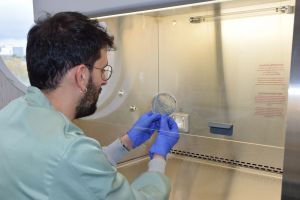La capacidad de las bacterias para evolucionar en respuesta a los tratamientos antibióticos ha impulsado la aparición y diseminación de factores de resistencia, un hecho especialmente preocupante en entornos clínicos. Cada vez es más complicado encontrar tratamientos eficaces que puedan curar a pacientes colonizados con bacterias resistentes.
Este nuevo trabajo, realizado por equipos del Centro Nacional de Biotecnología (CNB-CSIC) en colaboración con el Centro de Investigación Biológica en Red de Epidemiologia y Salud Pública (CIBERESP) del Instituto de Salud Carlos III; el Instituto Ramón y Cajal de Investigación Sanitaria (IRYCIS); la Universidad de Zúrich (Suiza), y el Instituto Pasteur (Francia), se ha centrado en los plásmidos, que permiten a bacterias no emparentadas compartir genes de resistencia a los antibióticos.
Álvaro San Millán, investigador del CSIC en el Centro Nacional de Biotecnología (CNB-CSIC) explica: “En ambientes hospitalarios, las bacterias portadoras de plásmidos de resistencia son capaces de saltar entre diferentes pacientes hospitalizados colonizando su microbiota intestinal. Hemos visto cómo los plásmidos permiten a las bacterias evolucionar rápidamente dentro de los pacientes”, destaca San Millán.
Para Javier de la Fuente, investigador en el CNB-CSIC y primer autor del trabajo, esta colaboración con el IRYCIS “ha permitido ver cómo se comportan las bacterias más allá del tubo de ensayo, analizando las bacterias en su ecosistema real: el intestino de los pacientes”. “Nuestros datos muestran cómo evolucionan y se adaptan a los tratamientos de antibióticos administrados a los pacientes, en una situación clínica real”, añade.
Rafael Cantón, jefe del servicio de Microbiología del Hospital Universitario Ramón y Cajal y también autor del trabajo, destaca: “El estudio forma parte de un proyecto europeo de vigilancia para la detección de bacterias multirresistentes en hospitales llamado RGNOSIS, el cual integra datos de más de 9.000 pacientes. Proyectos de este tipo son fundamentales para ayudarnos a entender y frenar la diseminación de la resistencia a los antibióticos”.
Más información
Javier DelaFuente, Laura Toribio-Celestino, Alfonso Santos-López, Ricardo León-Sampedro, Aida Alonso-del Valle, Coloma Costas, Marta Hernández-García, Lun Cui, Jerónimo Rodríguez-Beltrán, David Bikard, Rafael Canton, Alvaro San Millan. Within-patient evolution of plasmid-mediated antimicrobial resistance. Nature Ecology and Evolution, DOI: s41559-022-01908-7
CNB-CSIC Comunicación






